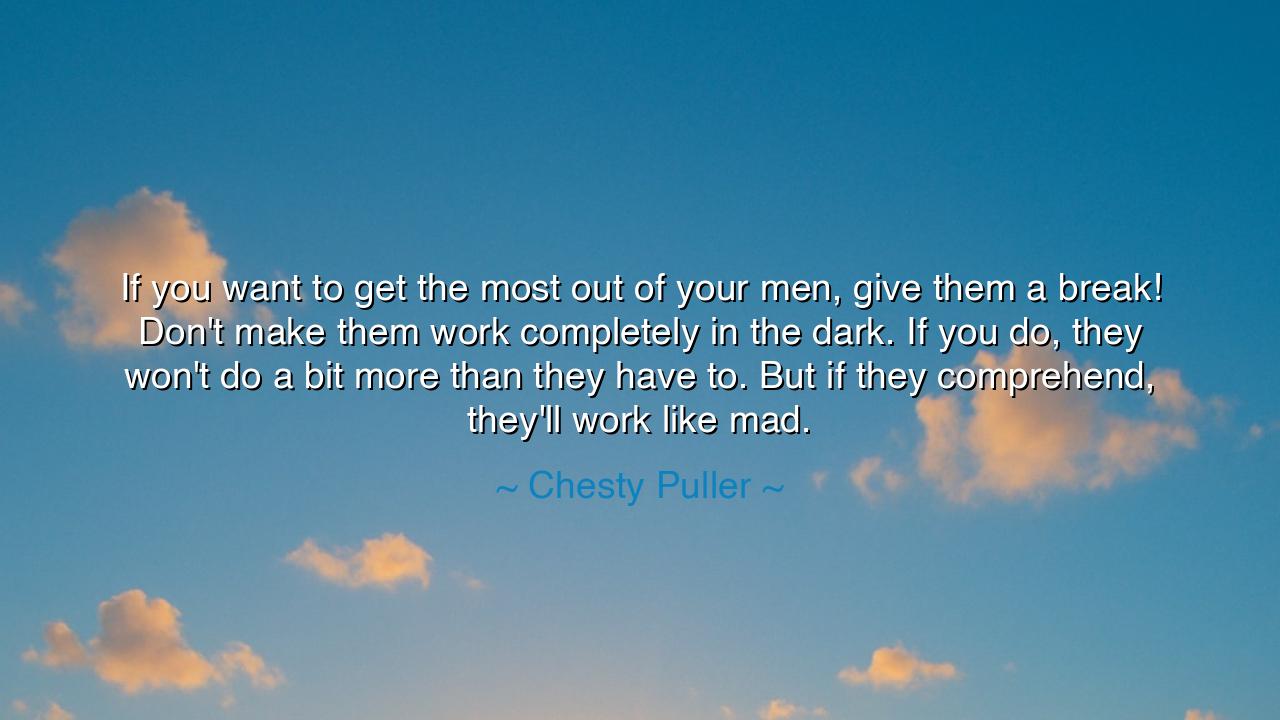
If you want to get the most out of your men, give them a break!
If you want to get the most out of your men, give them a break! Don't make them work completely in the dark. If you do, they won't do a bit more than they have to. But if they comprehend, they'll work like mad.






The words of Lewis “Chesty” Puller, the legendary Marine, resound with the clarity of one who knew the burdens of command: “If you want to get the most out of your men, give them a break! Don’t make them work completely in the dark. If you do, they won’t do a bit more than they have to. But if they comprehend, they’ll work like mad.” Here, the great warrior is not speaking of tactics or weapons, but of the deeper art of leadership: to respect those who serve, to share with them purpose, and to give them light in the darkness of labor. For men are not machines, they are souls, and when they understand why they struggle, their strength becomes boundless.
The ancients knew this truth. The Spartans fought not because they were forced, but because they understood the glory of defending their homeland. Alexander’s soldiers crossed deserts and mountains, not for pay alone, but because he shared his vision with them, feasted beside them, bled among them, and explained the greatness of their cause. Comprehension awakens passion; blind toil crushes it. To work in darkness is to labor without heart. To work with understanding is to labor with fire.
Puller’s words spring from the harsh crucible of war. As a Marine officer who served in Nicaragua, World War II, and Korea, he commanded men in desperate situations, where exhaustion and fear threatened to consume them. He learned that soldiers will do the bare minimum when treated as tools, but when treated as brothers, trusted with knowledge, and given moments of rest, they give not only their bodies, but their spirits. They “work like mad” not because they must, but because they choose to.
History shows us countless examples of this truth. Consider Winston Churchill in World War II. He did not simply demand sacrifice from his people; he explained the stakes with fiery words. He gave them light in the darkness, and though they endured bombings and shortages, they worked and fought with unyielding resolve. Contrast this with leaders who withhold truth, treating their people as pawns—such leaders reap only resentment, half-hearted labor, and eventual collapse. Puller’s teaching is clear: if you wish to inspire, share the truth and honor the humanity of those you lead.
The meaning of this wisdom is both practical and profound. Practical, because it reminds us that even in the smallest endeavors—whether leading workers, teams, or families—clear purpose and humane treatment multiply effort far beyond what coercion can achieve. Profound, because it speaks to the dignity of every human being. To treat others as machines is to drain them. To treat them as thinking souls is to unleash their highest potential. True strength is born from understanding and respect.
The lesson for us is simple yet demanding: do not keep those you lead in the dark. Share your vision with them, explain why the labor matters, and give them rest when it is needed. Do not fear that trust will weaken authority; in truth, it will strengthen it, for men and women gladly give their best when they feel valued and understood. To lead is not to conceal, but to illuminate. To command is not to grind, but to inspire.
The practical action is this: in your daily life, whether at work or at home, explain the “why” behind the tasks you ask of others. Praise their efforts openly, share in their hardships, and give them moments to breathe. If you do so, you will see loyalty grow, initiative flourish, and energy multiply. Remember Puller’s words: men in darkness give the minimum, but men who comprehend give their all.
Therefore, O listener, take to heart the wisdom of the old Marine: “Give them a break, let them comprehend, and they will work like mad.” For leadership is not about squeezing the last drop of strength from weary bodies, but about lighting a fire in willing hearts. And when hearts burn, no burden is too great, no obstacle too high—they will follow you to the ends of the earth.






AAdministratorAdministrator
Welcome, honored guests. Please leave a comment, we will respond soon